

Scaling-Up the Cooperative Movement. Group Decision Making Handbook_0.pdf. CBLD (CDS Resources) Ownership Associates: Services Overview. Living Systems Institute / Honeybee Keep / Nice World. The goal of the cooperative is to spread the practice of planting habitats in suburban landscapes.
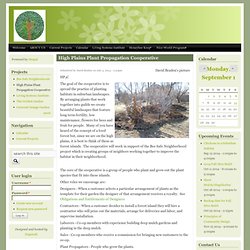
By arranging plants that work together into guilds we create beautiful landscapes that feature long term fertility, low maintenance, flowers for bees and fruit for people. Many of you have heard of the concept of a food forest but, since we are on the high plains, it is best to think of these as forest islands. The cooperative will work in support of the Bee Safe Neighborhood project which is creating groups of neighbors working together to improve the habitat in their neighborhood. The core of the cooperative is a group of people who plant and grow out the plant species that fit into these islands. Worcester Co-op Academy 2013 - Full Curriculum. New Organizing Institute Toolkit for Effective Organizations. Legal information, best practices, and supporting tools for cooperatively owned businesses and organizations. Worcester Roots Project.
Starting a Cooperative Buying Club. Welcome to Food Co-op Initiative's resource page for buying clubs and pre-order cooperatives.
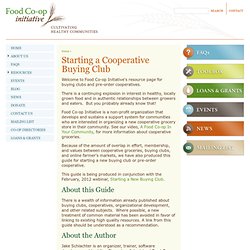
There is a continuing explosion in interest in healthy, locally grown food and in authentic relationships between growers and eaters. But you probably already know that! Food Co-op Initiative is a non-profit organization that develops and sustains a support system for communities who are interested in organizing a new cooperative grocery store in their community.
See our video, A Food Co-op In Your Community, for more information about cooperative groceries. Because of the amount of overlap in effort, membership, and values between cooperative groceries, buying clubs, and online farmer's markets, we have also produced this guide for starting a new buying club or pre-order cooperative. This guide is being produced in conjunction with the February, 2012 webinar, Starting a New Buying Club. About this Guide About the Author Acknowledgements Cooperatively yours, ICA Seven Principles Revision Guidelines 3, 5, 7 - 2013. Welcome to Commonomics. Multi-Stakeholders Cooperatives - Overview & Training Needs. Differentiating Organization & Tribe. Editor's note: this blog post is an excerpt of the upcoming Holacracy book.
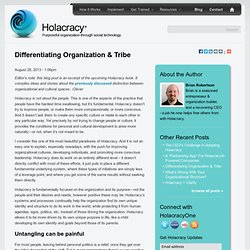
It compiles ideas and stories about the previously discussed distinction between organizational and cultural spaces. -Olivier Holacracy is not about the people. This is one of the aspects of the practice that people have the hardest time swallowing, but it’s fundamental. Holacracy doesn’t try to improve people, or make them more compassionate, or more conscious. Cooperatives and Community Development. Know Your Farmer Compass (Food Hub etc. USDA Search) Cooperatives. PM Press - John Curl. John Curl has been a member of Heartwood Cooperative Woodshop in Berkeley for over thirty years, and has belonged to numerous other cooperatives and collectives.

His historical writings includes History of Work Cooperation in America (1980). Memories of Drop City (2007) is his memoir of the 1960s commune movement. He is a translator and biographer of Inca, Maya and Aztec poets in Ancient American Poets (2006). His seven books of poetry include Scorched Birth, Columbus in the Bay of Pigs, and Decade: the 1990s. He is a longtime boardmember of PEN, chair of West Berkeley Artisans and Industrial Companies, a social activist, and has served as a city planning commissioner. Purchasing Links For All the People: Uncovering the Hidden History of Cooperation, Cooperative Movements, and Communalism in America, 2nd ed. It is the cooperation of working people that has brought the best of the United States to life.
For All the People seeks to reclaim this history. The Buzz Events Blog Posts Reviews Poetry. CDS Library Resource. Folder: Sample Policies, Bylaws, and Readers Folder: Charts and Other Handy Aids Online Recorded Workshops ORW Snippets Field Guide The Field Guide will develop as a topic-specific notebook-format and online resource for your board.
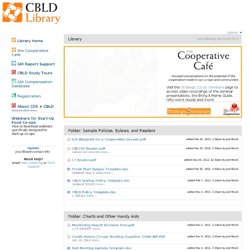
Your CBLD consultant can help you with any of these topics before and after the Field Guide resource is published. Articles Videos The CBLD Library is funded by co-ops participating in the CBLD program. The CBLD Library is set up as a good old fashioned lending library... you have access to download the files you need. We just ask that you let us know what you resources you downloaded. When you're done, please click this link and complete the brief form. Filene Home : Filene Research Institute. Advancing the Development of Worker Co-ops (ADWC) 2013. By Jessica Gordon Nembhard In 2011 GEO called together worker cooperative developers and supporters to discuss “Advancing the Development of Worker Cooperatives” (ADWC).
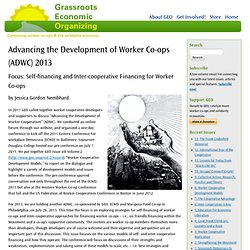
We conducted an online forum through our website, and organized a one-day conference to kick off the 2011 Eastern Conference For workplace Democracy (ECWD) in Baltimore. Sojourner-Douglass College hosted our pre-conference on July 7, 2011. We put together GEO Issue #8 Volume 2 ( “Worker Cooperative Development Models,” to report on the dialogue and highlight a variety of development models and issues before the conference. The pre-conference spurred conversation not only throughout the rest of the ECWD 2011 but also at the Western Worker Co-op Conference that fall and the US Federation of Worker Cooperatives Conference in Boston in June 2012. For 2013, we are holding another ADWC, co-sponsored by GEO, ECWD and Mariposa Food Co-op in Philadelphia, on July 26, 2013. What are the impacts to date of this example?
The 12 Habits of Highly Collaborative Organizations. Co-ops and environmental sustainability. University of Wisconsin Center for Cooperatives - Cover. University of Wisconsin Center for Cooperatives. Agricultural Economics Extension: Bill Fitzwater Cooperative Center. Starting a cooperative - Cultivate.Coop. Democracy at Work Institute. Multistakeholder%20coop%20manual. Legal-financial. The generation with an alternative future. Self Assessment Tool for Start Up Cooperatives - Cultivate.Coop. NEW!
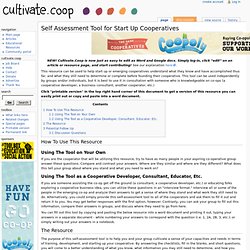
Cultivate.Coop is now just as easy to edit as Word and Google docs. Simply log-in, click “edit” on an article or resource page, and start contributing! See our explanation here. This resource can be used to help start up or emerging cooperatives understand what they know and have accomplished thus far, and what they still need to determine or complete before founding their cooperative. This tool can be used independently by groups and/or individuals, but it is best to use it in consultation with someone who is knowledgeable on co-ops (a cooperative developer, a business consultant, another cooperator, etc.) Click "printable version" in the top right hand corner of this document to get a version of this resource you can easily print out or copy and paste into a word document. How To Use This Resource Using The Tool on Your Own If you are the cooperator that will be utilizing this resource, try to have as many people in your aspiring co-operative group answer these questions. 1. 2. 3.